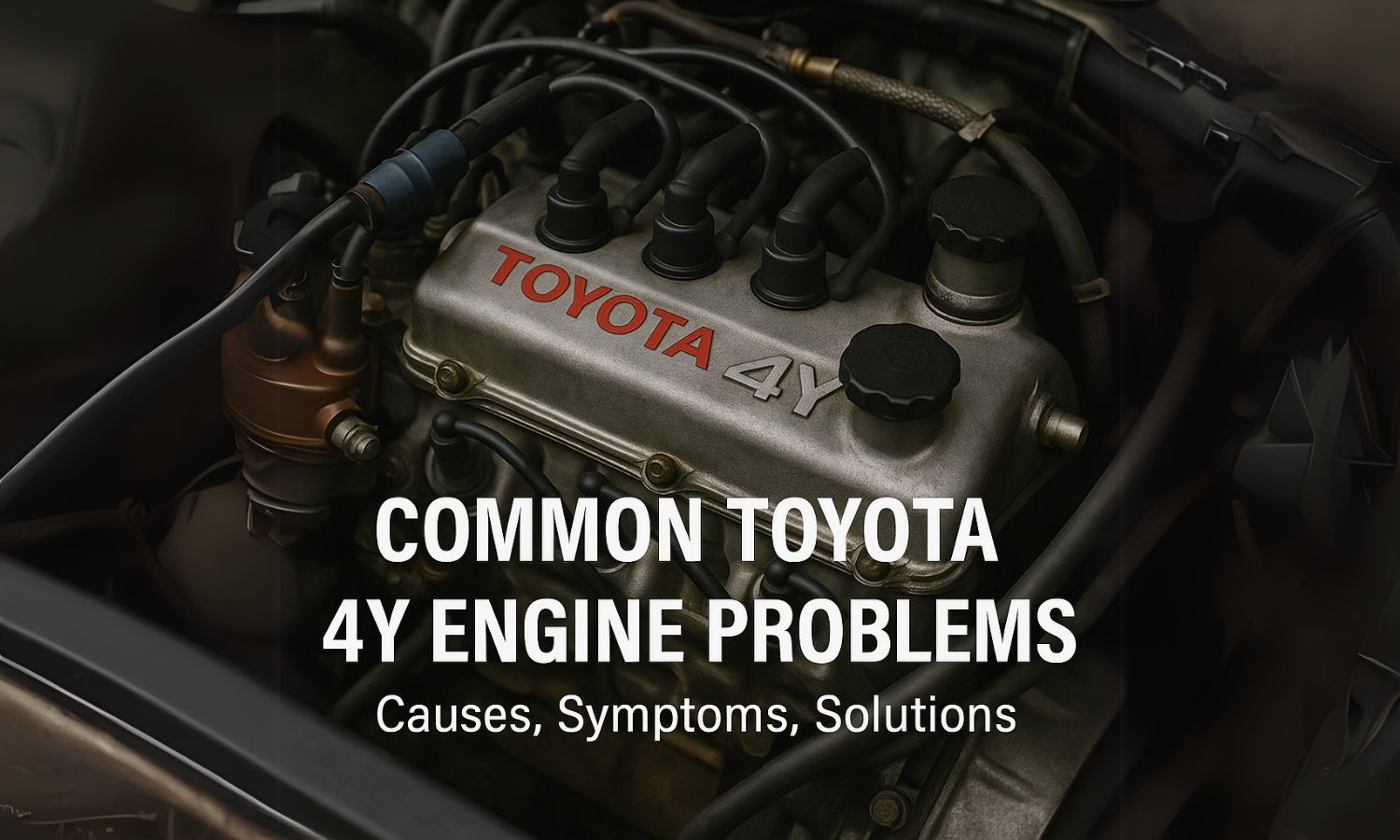
Common Toyota 4Y Engine Problems: Causes, Symptoms, Solutions
Key Takeaways
| Problem | Main Symptoms | Average Repair Cost |
|---|---|---|
| Engine Misfire | Rough idling, poor acceleration | R800-R2,500 |
| Overheating | High temperature readings, steam | R1,500-R4,000 |
| Oil Consumption | Blue smoke, frequent oil top-ups | R3,000-R15,000 |
| Timing Chain | Rattling noise, performance issues | R6,500-R12,000 |
| Carburetor Issues | Difficult starting, rough idle | R1,200-R5,000 |
| Hard Starting | Slow cranking, multiple attempts | R1,000-R4,000 |
| Low Compression | Power loss, poor fuel economy | R5,000-R25,000 |
The Toyota 4Y engine is renowned for its durability and reliability, commonly found in Toyota Hilux, HiAce, Forklifts, and other industrial applications. Despite its reputation for longevity, this 2.2-liter petrol engine can develop several common issues over time. This guide examines the most frequent problems, their causes, symptoms, and solutions to help you maintain your 4Y engine’s performance.
1. Engine Misfire
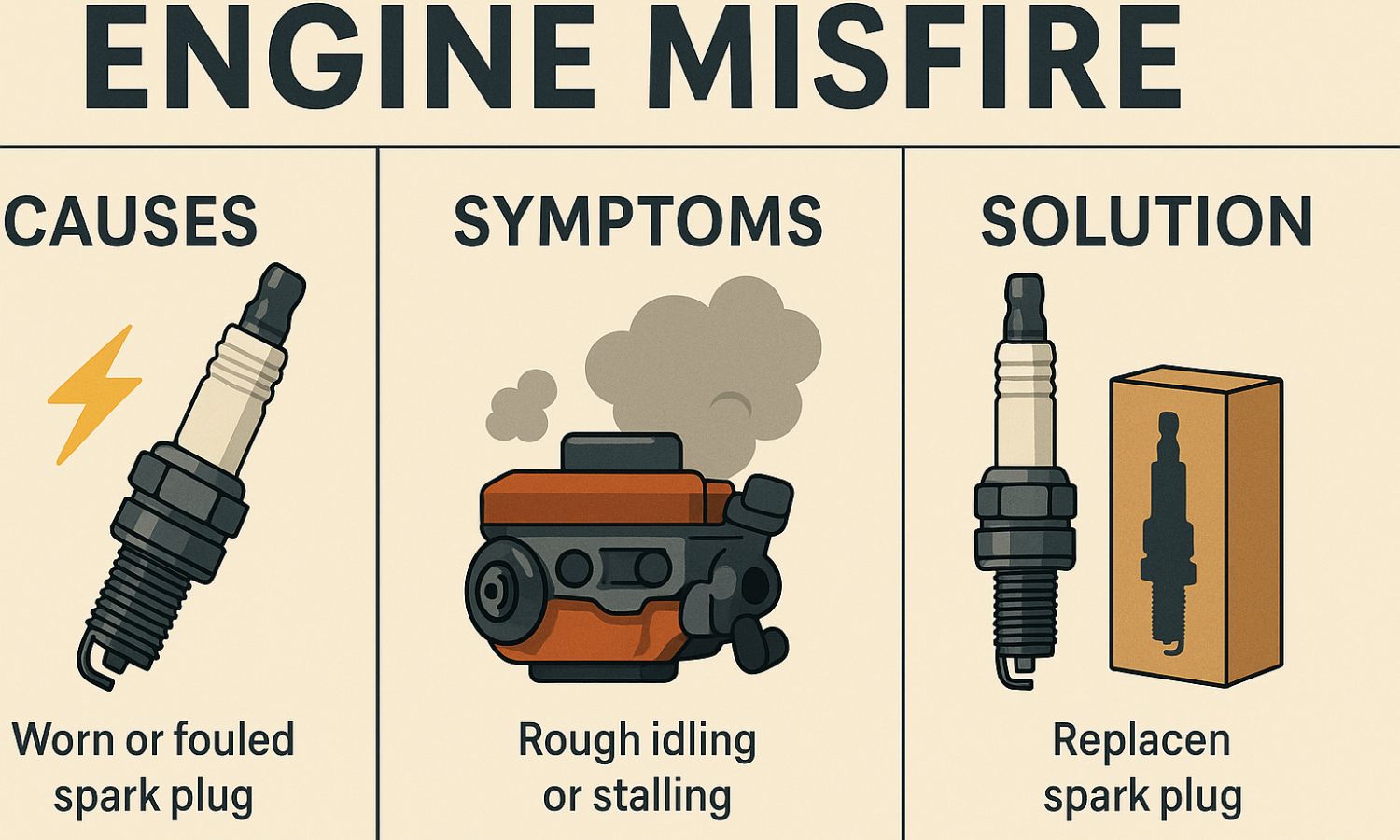
Causes
- Worn or fouled spark plugs
- Faulty ignition coil
- Damaged distributor components
- Clogged fuel injectors (in EFI models) or carburetor issues (in carbureted models)
- Vacuum leaks (particularly common in 4Y engines)
- Incorrect ignition timing
Symptoms
- Rough idling or stalling
- Poor acceleration
- Loss of power
- Increased fuel consumption
- Engine backfiring
- Check engine light (in newer models)
Solution
- Replace spark plugs (every 20,000-30,000 km)
- Inspect and replace ignition coil if necessary
- Check distributor cap, rotor, and gears for wear
- Clean or replace fuel injectors/clean carburetor
- Inspect and repair vacuum hoses and connections
- Reset ignition timing to manufacturer specifications (typically 5-8° BTDC for carbureted models)
Costs
- Spark plugs: R400-R700
- Ignition coil: R800-R1,500
- Distributor rebuild: R1,200-R2,500
- Carburetor cleaning/rebuild: R1,000-R2,500
- Professional timing adjustment: R500-R1,000
DIY Difficulty / Hours
- Spark plug replacement: Easy / 0.5-1 hour
- Ignition coil replacement: Easy / 0.5-1 hour
- Distributor service: Moderate / 1-2 hours
- Carburetor cleaning: Moderate / 2-3 hours
- Vacuum leak diagnosis and repair: Moderate / 1-3 hours
2. Overheating Problems
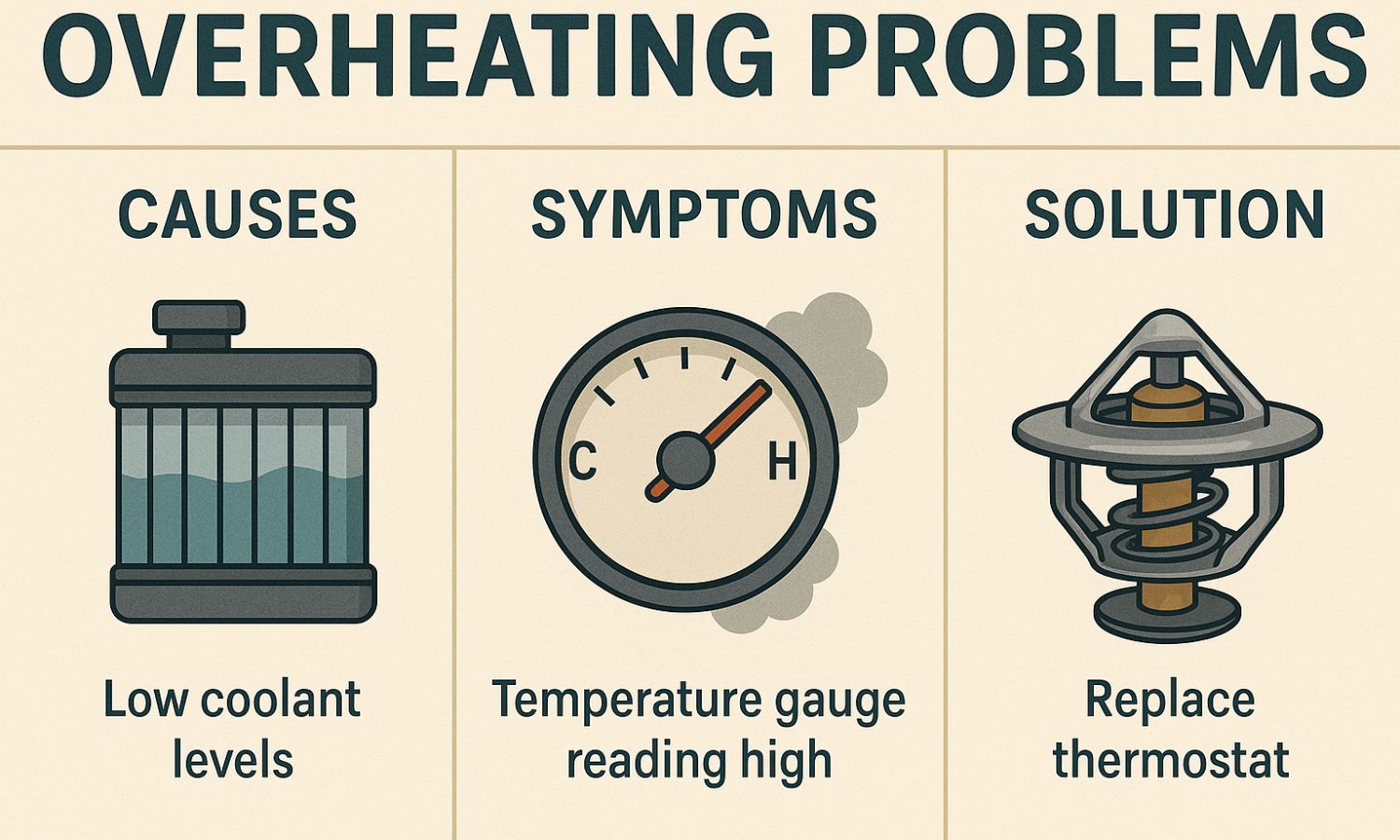
Causes
- Low coolant levels
- Faulty thermostat
- Clogged radiator
- Water pump failure
- Blocked coolant passages in engine block or head
- Damaged radiator cap
Symptoms
- Temperature gauge reading high
- Steam from engine bay
- Sweet smell (coolant)
- Engine power loss
- Engine warning light
Solution
- Check and replenish coolant levels
- Replace thermostat
- Clean or replace radiator
- Replace water pump
- Flush cooling system to remove deposits
- Replace radiator cap
Costs
- Coolant replacement: R300-R500
- Thermostat replacement: R500-R1,200
- Radiator replacement: R2,000-R4,000
- Water pump replacement: R1,500-R3,000
- Cooling system flush: R600-R1,200
DIY Difficulty / Hours
- Coolant top-up: Easy / 0.5 hour
- Thermostat replacement: Moderate / 1-2 hours
- Radiator replacement: Moderate / 2-3 hours
- Water pump replacement: Difficult / 3-5 hours
- Cooling system flush: Moderate / 1-2 hours
Warning: Never Open a Hot Radiator
Opening the radiator cap when the engine is hot can cause serious burns from escaping steam and hot coolant. Always wait until the engine has completely cooled down.
3. Excessive Oil Consumption
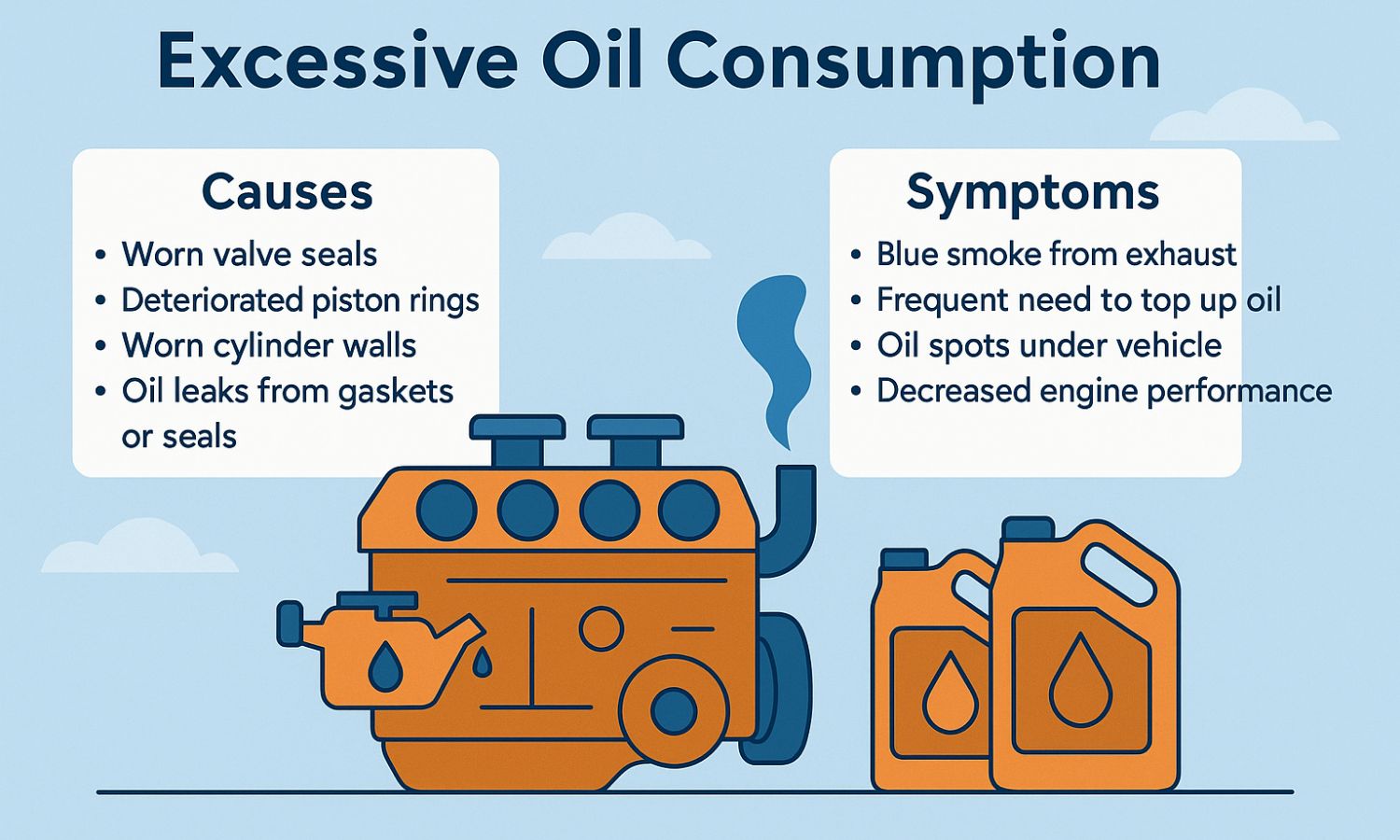
Causes
- Worn valve seals
- Deteriorated piston rings
- Worn cylinder walls
- Oil leaks from gaskets or seals
- PCV (Positive Crankcase Ventilation) system issues
Symptoms
- Blue smoke from exhaust
- Frequent need to top up oil (more than 1L per 1,000 km)
- Oil spots under vehicle
- Decreased engine performance
- Fouled spark plugs
Solution
- Replace valve seals
- Replace piston rings
- Rebore cylinders if necessary
- Replace leaking gaskets and seals
- Clean or replace PCV valve
Costs
- Valve seal replacement: R3,000-R6,000
- Piston ring replacement: R8,000-R15,000
- Engine rebore: R6,000-R10,000
- Gasket replacement: R1,000-R5,000 (depending on which gasket)
- PCV valve replacement: R300-R800
DIY Difficulty / Hours
- Valve seal replacement: Difficult / 6-10 hours
- Piston ring replacement: Very Difficult / 10-15 hours
- Engine gasket replacement: Moderate to Difficult / 2-8 hours (depends on gasket)
- PCV valve replacement: Easy / 0.5-1 hour
Monitoring Tip
Keep a log of your oil consumption. If your engine is using more than 1 liter of oil every 1,000 kilometers, it indicates a significant problem that needs attention.
4. Timing Chain Problems
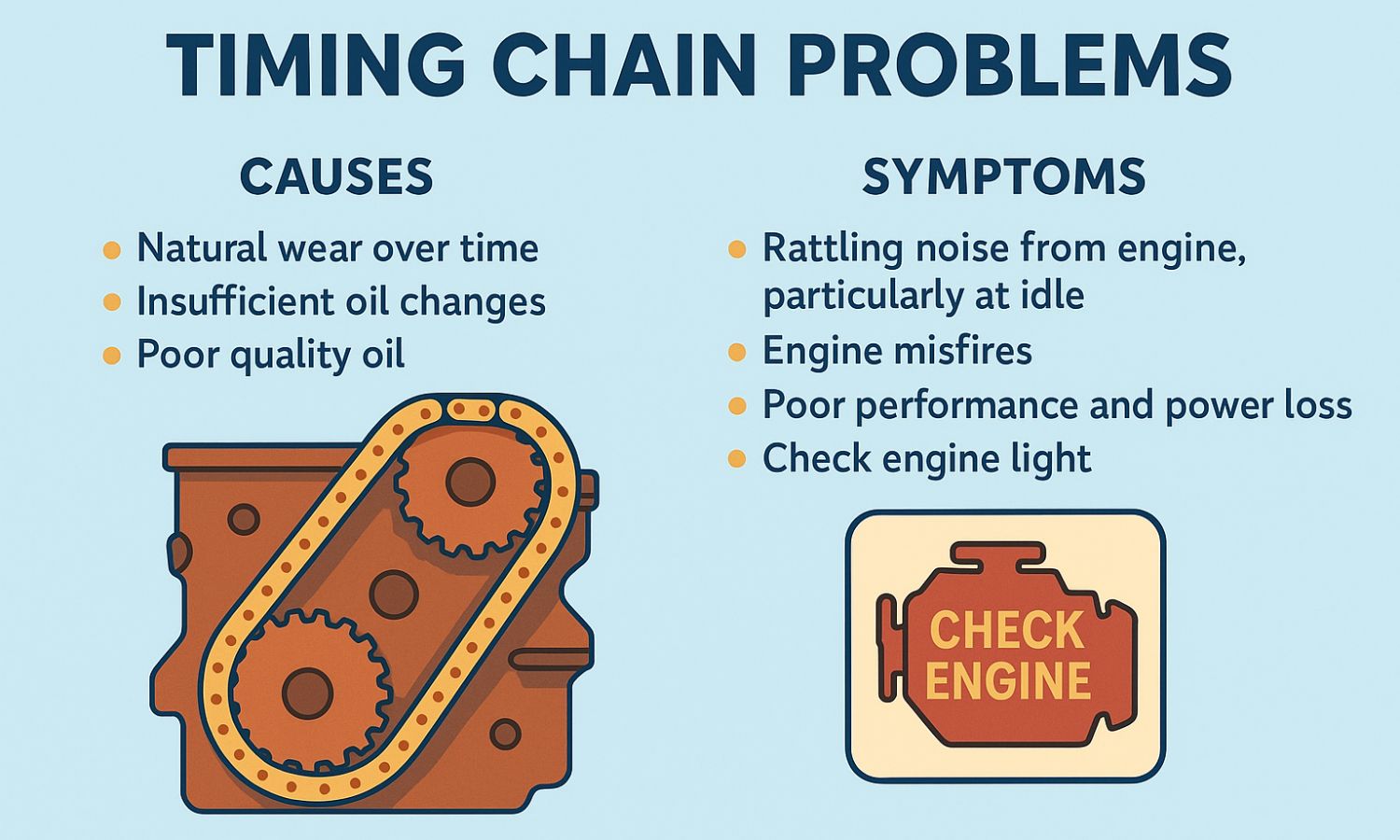
Causes
- Natural wear over time
- Insufficient oil changes
- Poor quality oil
- High mileage
Symptoms
- Rattling noise from engine, particularly at idle
- Engine misfires
- Poor performance and power loss
- Check engine light
- Chain jumping teeth causing valve timing issues
Solution
- Replace timing chain, guides, and tensioner
- Verify camshaft and crankshaft timing marks align correctly
- Use quality engine oil and maintain regular oil changes
Costs
- Timing chain kit replacement: R3,500-R7,000
- Labor costs: R3,000-R5,000
DIY Difficulty / Hours
- Very Difficult / 6-10 hours
- Requires specialized tools and technical knowledge
Timing Chain vs. Belt
The Toyota 4Y engine uses a timing chain rather than a belt, which typically lasts longer. While timing belts usually need replacement every 60,000-100,000 km, timing chains can often last the lifetime of the engine when properly maintained.
5. Carburetor Issues (In Carbureted Models)
Causes
- Dirt and carbon buildup
- Worn parts
- Incorrect adjustment
- Stuck float
- Clogged jets
Symptoms
- Difficulty starting
- Rough idle
- Poor fuel economy
- Stalling
- Black smoke from exhaust
Solution
- Complete carburetor clean and rebuild
- Adjust idle speed and mixture settings
- Replace worn parts
- Check and adjust float level
Costs
- Carburetor cleaning: R800-R1,500
- Complete rebuild kit: R1,200-R2,500
- New carburetor: R2,500-R5,000
DIY Difficulty / Hours
- Cleaning: Moderate / 2-3 hours
- Rebuild: Difficult / 3-5 hours
- Requires knowledge of carburetor systems
6. Hard Starting Problems
Causes
- Weak battery
- Failing starter motor
- Fuel delivery issues
- Ignition system problems
- Incorrect timing
- Bad fuel pump
Symptoms
- Engine cranks slowly or not at all
- Clicking sound when trying to start
- Engine turns over but doesn’t start
- Requires multiple attempts to start
Solution
- Test and replace battery if necessary
- Check starter motor and replace if faulty
- Clean or replace fuel filter
- Check fuel pump operation
- Verify ignition timing
Costs
- Battery replacement: R1,000-R2,000
- Starter motor replacement: R1,500-R3,500
- Fuel filter replacement: R300-R800
- Fuel pump replacement: R2,000-R4,000
DIY Difficulty / Hours
- Battery replacement: Easy / 0.5 hour
- Starter motor replacement: Moderate / 1-2 hours
- Fuel filter replacement: Easy to Moderate / 0.5-1 hour
- Fuel pump replacement: Moderate to Difficult / 2-4 hours
7. Low Compression Issues
Causes
- Worn or damaged valves
- Blown head gasket
- Worn piston rings
- Cylinder wall scoring
- Cracked cylinder head or block
Symptoms
- Difficult starting
- Loss of power
- Increased oil consumption
- Poor fuel economy
- Failed compression test
Solution
- Valve job (grind/replace valves and seats)
- Replace head gasket
- Replace piston rings or rebuild engine
- Repair or replace cylinder head
Costs
- Valve job: R4,000-R8,000
- Head gasket replacement: R5,000-R10,000
- Engine rebuild: R15,000-R25,000
- New/reconditioned cylinder head: R6,000-R12,000
DIY Difficulty / Hours
- Valve job: Very Difficult / 8-12 hours
- Head gasket replacement: Difficult / 6-10 hours
- Engine rebuild: Very Difficult / 20+ hours
- Requires specialized tools and technical knowledge
When to Consider Replacement
If your 4Y engine has multiple serious issues, especially in older vehicles, it might be more economical to replace the engine with a quality used or reconditioned unit. Visit our Toyota engines for sale page to explore options.
Preventative Maintenance Tips
To avoid many of these common problems with the Toyota A series engines, follow these maintenance recommendations:
- Regular Oil Changes: Every 5,000 km using the recommended grade (typically 10W-30 or 15W-40)
- Air Filter Maintenance: Check every 10,000 km, replace every 15,000-30,000 km
- Spark Plug Replacement: Every 20,000-30,000 km
- Cooling System Flush: Every 40,000-60,000 km
- Timing Chain Inspection: Every 80,000-100,000 km
- Valve Clearance Adjustment: Check and adjust every 40,000 km
- Fuel System Cleaning: Every 30,000 km for carbureted models
Following these maintenance schedules can help extend the life of your Toyota 4Y engine and avoid costly repairs. When properly maintained, these engines are known to last well over 300,000 km before requiring major overhaul.
Consider Professional Help
While many maintenance tasks can be performed by DIY enthusiasts, complex repairs should be handled by experienced mechanics who specialize in Toyota engines. If you’re not confident in your abilities, it’s better to seek professional assistance.
Conclusion
The Toyota 4Y engine remains one of the most reliable commercial engines ever produced, but it’s not immune to problems, especially as it ages. Regular maintenance is key to preventing many of these issues.
If your engine is beyond economical repair, consider visiting your local Toyota scrap yard for affordable parts or checking vehicles that are Toyota stripping for spares.
For vehicles with severe engine damage, it may be more cost-effective to sell your car for scrap and invest in a different vehicle, rather than paying for extensive engine repairs.
Frequently Asked Questions
Q: How long should a Toyota 4Y engine last?
A: With proper maintenance, a Toyota 4Y engine can last 300,000-500,000 kilometers before requiring a major overhaul.
Q: Is the 4Y engine fuel efficient?
A: For its era and size, the 4Y offers reasonable fuel efficiency, typically achieving 10-12 L/100km in normal driving conditions.
Q: Can I convert my carbureted 4Y engine to fuel injection?
A: Yes, conversion kits are available, though this is a complex modification that requires significant mechanical knowledge.
Q: What oil is best for a Toyota 4Y engine?
A: Toyota recommends 10W-30 for most climate conditions, or 15W-40 for hotter climates and high-load applications.
Q: How can I identify if my vehicle has a 4Y engine?
A: The engine code can be found on a plate or sticker on the engine block. The 4Y will have “4Y” as part of the engine code.
Q: Are parts for the 4Y engine still readily available?
A: Yes, given the widespread use of this engine in industrial applications like forklifts, parts remain widely available through Toyota suppliers and aftermarket channels.
